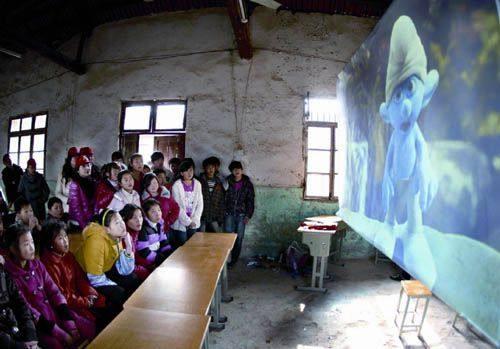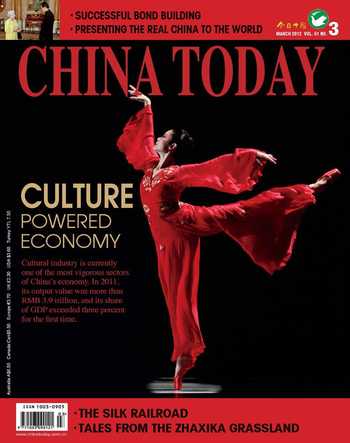Providing funds for cultural industries

IN 2009, 20th Century Fox produced Avatar, grossing nearly US $2.8 billion at the global box office. Over in Germany, international publishing giant Bertelsmann made profits of some US$13.7 billion in the first three quarters of 2011. In China, however, the second largest economy in the world, there is not a single comparable cultural corporation. In October 2011, the Chinese government put new emphasis on the need to speed up the development of Chinas cultural industries and make them a pillar of the national economy. This move will lead to greater cultural wealth in the country, which already boasts one of the worlds four oldest civilizations.
Cultural Coffer
Cultural development costs money, and financial support and taxation policies can play a massive role in increasing public access. In recent years, the government has unveiled a series of policies to support the restructuring of cultural industries and non-profit cultural undertakings and to ensure the smooth transition of state-owned profit-oriented cultural enterprises into independently run companies.
Up until 2010, the central coffer allocated a total of RMB 4.2 billion to a special fund on cultural development, which mainly supported the growth of newly independent companies and the cultivation of essential cultural industries. The central government and local governments in Jiangsu and Shanghai moreover set up investment funds and channels for investment for cultural industries. Preferential tax policies have been launched specifically to support non-profit cultural activities and the development of cultural undertakings, such as the exemption of sales tax on tickets for memorial halls, museums and galleries.
Supporting policies will extend for another five years, during which time the government will encourage private funding of cultural industries, support major cultural projects and strive to develop new media and cultural industries.

Giving Culture a Leg-Up
When the state-owned theatrical groups in Anhui Province transformed into independently run companies a few years ago, many employees worried that without state funding they would struggle to make ends meet. Since 2009, however, the Anhui Provincial Department of Finance has allocated them an annual subsidy of RMB 20 million. Now their performers can put aside worries about financial details and focus all their energy on artistic creation and performing.
This was part of a nationwide trend in China during the 11th Five-year Plan (2006-2010), with investment in cultural undertakings increasing steadily. National investment in culture, sports and the media rose from RMB 59.7 billion in 2005 to RMB 154.3 billion in 2010. During those five years, the central treasurys allocation increased from RMB 10.2 billion in 2005 to RMB 31.6 billion in 2010, up 25.4 percent annually on average.
As a result, Chinas cultural undertakings have flourished. Many cultural companies benefit from the financial support. Beijing Childrens Art Theater has produced several high quality childrens dramas that have achieved box office success since it became an independently run enterprise, and its annual income has leapt from RMB 770,000 to RMB 70 million. In the film industry, Henan Provincial Film Company underwent the same transformation, changing its name to Henan Oscar Theater Chain Co., Ltd. in the process, and has now achieved the 10th largest ticket sales in the country. Jiangsu Phoenix Publishing & Media Group has continued to grow at more than RMB one billion per year in the four years since its restructuring reform. Tianjin Daily Press Group has also achieved success, establishing a publication distribution network, which rapidly increased its market share and influence.
While individual enterprises have gained success and recognition, projects to increase cultural services in rural areas have been undertaken. Radio and television coverage has now expanded to every village in the nation, communities have benefited from new cultural centers and libraries, and citizens have been treated to free film showings. Financial input has also proved indispensable in offering free entrance to museums, memorial halls and national patriotism education bases, and protecting cultural heritage.
According to the Ministry of Finance, government investment in cultural undertakings will continue to increase in the coming years. Government offices at various levels will guarantee that the increase of investment in culture is higher than the growth of fiscal revenue, and expand the proportion of cultural expenditure in the total financial expenditure. Meanwhile, governments at various levels should expand channels of sources for cultural input, and work hard to increase cultural input from non-tax revenues. Investment structure will be adjusted to optimize results, including measures such as special funds for building cultural facilities in rural areas, support for the protection of traditional culture, promotion of the digitalization of historical cultural sources, the establishment of more Chinese cultural centers abroad, and promotion of intergovernmental cultural exchanges.


Guaranteed Funds for Grassroots
Supported by financial departments at various levels, public cultural services have extended to every corner of urban and rural China. Zhangjiagang City in Jiangsu Province has built libraries for farmers, Jinghai County in Tianjin has equipped all 383 villages with standard rural reading rooms and Longjiang Cultural Station in Hanzhong City, Shaanxi Province sends books to farmers, construction workers and the disabled during festivals and holidays.
During the 11th Five-year Plan period(2006-2010), new patterns of financially supporting both nonprofit and profit-oriented cultural activities were explored. The effectiveness of investment is continually growing and initiatives are encouraged such as new ways of managing funding, the establishment of national publishing funds, and the subsidizing of non-profit publishing projects. China has also encouraged local finance to increase input into rural culture, and helped local areas to launch rural cultural activities with local flavors.
The government has also found innovative ways to provide financial backing and improve the efficiency of funds.Part of this is the creation of the China Culture Industry Investment Fund, which was launched on July 6, 2011 and is the first national culture industry investment fund in the country. Sponsored by the Ministry of Finance, BOC International Holdings, China International Television Corporation and China Shenzhen International Industries Fair Co., Ltd., it plans to raise RMB 20 billion, and RMB 6 billion in the first phase.
According to the Ministry of Finance, in the future the government will continue to play a central role in funding cultural development and introduce measures to encourage enterprises and individuals to provide cultural services to the public. Private funding, however, will also be encouraged, and the government has established a special fund for the development of cultural industries that aims to entice contributions from private investment, so that cultural industries will no longer be reliant on government funding.

